- Home
- Helen Dunmore
Counting the Stars Page 3
Counting the Stars Read online
Page 3
‘Yes, last September,’ he murmurs.
‘I haven’t been sleeping properly. And I’ve lost weight – look. Every night I dream and I toss back and forth, back and forth – and sometimes I cry out –’
‘And so your husband sends you to Baiae.’
‘I send myself,’ she says. ‘I’ve given myself a thorough examination and considered all my symptoms.’
‘Which are?’
‘Feel my pulse. No, not there, there. Can’t you feel how fast it’s beating? That’s a sign of fever. And my lips have never been so dry. I’m thirsty all the time. I want something and I don’t know what it is.’
‘Don’t you?’
Her eyes narrow. Her softness vanishes. ‘You think it’s you. You think you’ve caught me, don’t you?’
‘We’ve caught each other. Why can’t you admit it?’
She laughs, not very pleasantly. ‘You think you can put me into a cage, like my sparrow, and I’ll hop about until you come along with a bit of cake and let me sing for it? But even my sparrow is wiser than you think. He tells me things that no one else knows. Sometimes I think I love him more than anything else on earth.’
He sits up with a jerk and turns his back on her. ‘I’ve got to go.’
‘Why does every little thing make you angry? It doesn’t hurt you if I love my sparrow.’
‘You go too far, Clodia. You know what you said. I’m not one of your pretty boys who’ll swallow anything.’
‘I assure you, my friend, any swallowing that takes place isn’t done by them.’
‘You bitch.’
‘That’s not what you said two days ago. “A thousand kisses, and then a hundred more, and then another thousand…” Wasn’t that it?’ With a swift, sudden movement she climbs on to the bed, curls around him and puts her arms around his neck. ‘Why are we arguing?’ she murmurs. ‘Why not just come to Baiae? I’m a good doctor – I can prescribe for you as well as for myself. Let me see…’ She unclasps him and takes his face between her hands. ‘You’re pale, and you’ve got shadows under your eyes. Do you remember the first time you saw me, at our dinner? You were so handsome. Your skin looked golden. Every time I moved I felt your eyes on me. And you were so funny – you made me laugh so much –’
It floods back to him. The table was loaded with lobster, mullet, a whole sucking pig. He ate almost nothing. He thought he’d been struck dumb by her, but no, he’d made her laugh. He’d felt raised up and full of power. Words would do whatever he wanted. He could weave them into spells which would bind her.
Her husband had eaten some plain dish of roast meat. The elaborate feast was for his guests. A man of the old school, with hard, trained appetites, that was Metellus Celer.
‘Everybody wanted to talk to you,’ Clodia continues. ‘You were twice as alive as anyone else at the table, as if you had a secret no one else knew. Even my husband thought it was quite a coup, getting you to recite after dinner. “The most brilliant of our young poets” – he said that afterwards. “People who claim there’s nothing in this ‘new poetry’ are not using their ears.”’
‘Did he really say that?’
‘He’d have been repeating what someone else had told him. You brought lustre to our table, my dear poet, and my husband is a man who can respect something for which he has no personal feeling or even liking. But now look at you. You’re pale. You aren’t well. I prescribe… now let me see… yes, the perfect medicine for you is a course of treatment at the Baiae thermal baths. And you must drink the waters. The air’s so good down there, you’ll soon turn golden again.
‘Listen. You can’t imagine how beautiful it is in the evenings. when it’s not quite dark, but the first stars are coming out. The frogs croak and the crickets chirp under the myrtles. You point at one star, and then another, and suddenly there are so many you can’t count them, and before you know what’s happened the moon has risen too. And then – this is the best part – you wander along the shore until all the villas are behind you, and you’ve got rid of all the heavy-breathing old senators who think that because they’re lumbering around like elephants in short tunics every woman in Baiae is longing to see what they’ve got underneath.
‘You find a little beach, and slip off your clothes, and walk into the water. Water feels quite different at night, did you know that? But of course you must have a friend with you, because it’s dangerous to bathe alone. And your friend walks into the water too, and you reach out your arms and find him.’
‘Yes,’ he murmurs, and reaches up, and pulls her down to him.
‘Hold me like that,’ she says. ‘Just like that.’
Three
The calm surface of the sea quivers in the late-morning light. He disturbs a viper, coiled in the dust of his path. It uncoils like a whip and glides into the scrub. He must remember to tread more heavily, so that the snakes feel his footsteps and make their escape.
He’s been in Baiae for ten days already. A small routine has established itself. He gets up early, eats bread and cheese or a few dried figs, and then settles on the vine-shaded terrace with his stylus and tablets. It’s very quiet. He has few visitors and he pays as few visits as possible. He’s come down here with the minimum of slaves. Lucius, his steward, has stayed behind in Rome.
‘There’ll be nothing for you to do in Baiae, Lucius. I shan’t be entertaining. I’m going down there to take the waters, and write.’
Lucius looked doubtful. ‘All the more reason for me to be there and run everything, if it’s peace and quiet you want.’
‘I need you in Rome. I can’t trust anyone else as I trust you.’
Lucius nodded, acknowledging the case.
So there won’t be many parties, but Catullus doesn’t mind that. All the friends he really wants to see are in Rome or the countryside. Baiae is too flash for them – or simply too expensive.
His true friends, the ones who’ll read the twentieth draft of a poem as keenly as the first. And he will do the same for them. He thinks of them with a flush of affection. His dear Calvus, with his grasshopper body and lofty, brilliant mind. Fabullus, to whom you can tell everything, because, as he says, ‘I’m the grave of every secret’; Veranius, with his Gaul-green eyes glistening with laughter. Friends who know when to praise a poem, and when to rip into it:
– It’s got two good lines, and it’s as tight as a drum technically, but you’ve written the subject to death. What we don’t know about Juventius’ honey-sweet arse and what you’d like to do with it could fit on the point of this pin. Even you are bored by it.
– Boredom’s a good subject for a poem. And to be bored by an arse is original, at least.
– Yes, but bored writing is unforgivable.
Calvus, Fabullus, Veranius. His people, the ones he writes for. The ones who know where poems come from, how they work, and where they fail. They know the mystery well enough to see the wheels turn in its heart.
He writes, erases, writes again. The words tease like mosquitoes, out of reach. Today he’d rather do anything but this. Even a morning trapped with one of Rome’s really celebrated egotists – Sestius, perhaps – would be better than this itch of words that just won’t let him scratch.
A light breeze shakes the oleanders. Their deep red flowers shiver, then are still. Everyone raves about Baiae. He sees that it’s beautiful, but doesn’t feel it. He’d so much rather be at Sirmio, on the shore of his own northern lake. Rather anywhere than here, where everyone’s so ostentatiously having a good time and he can’t get away from the sight of Clodia, in her thinnest silks, her head flung back and her throat bare as she laughs. She seems to be always laughing.
He’d like to know what there is to laugh about. Her husband, the upstanding Metellus Celer, with his soldierly stride, his practical grasp of every situation, his power and glory and his way of seeing a joke a few seconds after everybody else and laughing loudly, dutifully to make up – Yes, her husband, against all the odds, has come to Baiae this season, just
as Clodia promised he wouldn’t.
Perhaps he just wants to see the splendid villa that he’s been pouring money into for years, without ever bothering to stay there. Or perhaps he’s more clued-up than he looks. It might be dangerous to take at face value his air of nobly noticing nothing that his wife is up to. He may not be all that quick-witted, but he’s used to power. His hands are on all the ropes of Rome, and no doubt he intends to keep it that way.
Something’s made Metellus Celer break with his iron personal traditions and come to Baiae, instead of making the usual dignified progress around his many estates to receive diligently prepared accounts from his many stewards. Clodia says her husband is quick to spot any fudge in the figures. Maybe he’s spotted a fudge in the facts of her life, too.
You really shouldn’t keep bringing up my name in front of your husband, Clodia. It’s not very clever. You think that as long as you attack me, you’re safe. But don’t you think he notices how often my name is in your mouth, and how your eyes sparkle as you heap insults on me and my work?
‘How sublimely self-centred he is, just like all the other “new poets”. Their conceit is the most original thing about them. They take themselves so very seriously, beneath the jokes. He was fun at first, but I know how bored you were the last time he came to dinner. Positively glazed over, weren’t you, my dear?’
But how does your husband answer?
‘I wasn’t bored, my dear.’
You didn’t take warning. You reported the conversation to me as if it were a game you’d won. You went on playing, and you scoffed at the idea that your husband might be playing, too.
‘And now I’ve discovered that he’s here in Baiae for the whole season, when we simply want to relax. And when I’ve finally got you to Baiae for once – Why don’t these young men ever go home and visit their fathers? But I suppose we’ll have to ask him to dinner.’
‘Why not?’
You rolled my name around in your mouth, Clodia, and then you spat it out. I’m sure your husband hears more than you think. But he greets me with his usual impeccable politeness. The point is, though, that he doesn’t leave you alone. He remains in Baiae, sitting it out.
He’s even organized a boating party today. I can just imagine it. The entire villa party will sail along the shore until they reach a private beach with artfully rustic couches set up for them under canopies of vine leaves and myrtle branches. The unpretentious table will be covered with a snow-white cloth. Lobster with asparagus, roasted capons, pickled quails’ eggs in a salad of mint and lettuce, gamey slices of roast boar with spiced apple relish, strips of tender kid seethed in the milk of its own mother, pomegranates, preserved quince paste, dates and apples of Hesperus –
Good, plain food, everything of the first quality. Metellus Celer will permit no tasteless nouveaux exaggerations at his table. There’ll be no gimmicks and no surprises.
‘I’m a man of simple tastes,’ he’ll say, with an offended stare, if any innovation is suggested. ‘I leave that sort of thing to other people.’
Clodia ought to smuggle a couple of dancing-girls into her husband’s ‘simple picnic, with just a few close friends’. That would make them all sit up, those senators dressed in daringly short tunics and creaky holiday smiles. They’ll all be goggling at Clodia as the breeze blows her silk dress over her body and moulds it to her breasts and thighs. There’s no doubt that she’s a damned fine woman, they’ll say to themselves. At the same time they’ll thank their stars that their own wives know how to behave and are safely at home, upholding the strictest standards of Republican matronhood, and speaking only to approve their husbands’ utterances.
Or maybe – just maybe – those wives are rolling around in the matrimonial bed with a handsome steward. While the senator is away, the senatresses do play. Let’s hope so. Those senators deserve to pay for licking Clodia all over with their lascivious glances, and for the way they’ll toss themselves off in their sleepy villas at siesta time, dreaming of her thighs…
What a boating party! He laughs out loud, harshly. A lizard takes fright, and runs away up the wall. Clodia has sent him an invitation, naturally, but he’s not going to go. He has no desire to spend hours watching her preen in sexual attention, dressed in one of her fetchingly simple ‘seaside’ outfits, laughing, teasing, dropping back into silence as she trails one hand in the water and mesmerizes some other poor fool with the darkness of her dreaming eyes.
Yes, her eyes are dark, although they seem bright. Her enemies call them cow eyes, or pretend to praise her by saying that her eyes are as lustrous as Hera’s. And who did Hera take into her bed but her brother, Zeus? Clodia is almost as fortunate as Hera; she may not have Zeus for a brother but she’s got Pretty Boy Clodius, the handsomest sibling any girl could ask for. What a fine pair they make.
Always the pretend praise, followed by insinuations. Clodia says she takes no notice, it just makes her laugh. She has all the annihilating pride of the Clodii and now of the Metelli too, and with it a quality which is hard to define because it seems to change day by day as the light of his imagination plays on it. She follows a path no one else sees. She seems to walk freely.
Once, before she was married, Clodia made a pilgrimage to Paphos. She’d had a dream, she told him, in which Aphrodite had appeared to her in a chariot drawn by sparrows. The goddess had said nothing, but had held up her right arm and beckoned to Clodia as she was swept to earth.
‘She wanted me to come and worship at her shrine.’
He looked at her hard, suspecting her. Clodia had wanted a voyage, maybe. She’d grabbed the chance to enjoy freedom in the guise of a pilgrimage, before her family married her off.
‘Did they want you to go to Paphos? Your family?’
She shrugged. ‘Of course not. It was very inconvenient for them. It meant delaying the wedding.’
‘But you went anyway.’
‘Better to start marriage with a blessing than a curse. If a goddess calls you, you must go.’
He applauded her inwardly. Those must have been her exact words. They would have stopped family opposition in its tracks.
Her face was as smooth as rock. He wanted so much to believe that she had really believed in her pilgrimage: that she hadn’t used – or invented – her vision to get her own way. She’d braved the voyage for the sake of something, whatever it was. Dark seas, late-season storms, the taste of salt day after day, whenever you lick your lips. The sea makes everything else unimportant. Even Rome recedes…
(He should travel. He should get right away, Baiae is no good. It’s Rome-on-Sea, with all the same old faces, the same old gossiping and politicking. Even when you’re face down and naked on the slab at the thermal baths, being pummelled by the best masseur in Baiae, you can’t let up. You’ve got to keep your wits Rome-sharp.)
It was a long voyage for Clodia, though, all the way to Cyprus. There’s enough weather in April to make a ship bucket, even though the waves are bright. Something must have driven her there. The thought of her marriage, perhaps. Clodia was to be handed from the Clodii to the Metelli: it was an alliance between cousins, of the kind that keeps Rome strong. Patrician families must marry with care, to advance the power and honour of the clan. They got more than they bargained for with Clodia, he thinks with a grim smile.
She must have been about fifteen. Maybe sixteen. Virginal, innocent.
(Or perhaps neither, if the rumours are true. The things a girl should hope for had already happened to her in secret.)
What was she really like then? It gnaws him, because he’ll never know that fifteen-year-old Clodia. All he can know is the Clodia of now: lovely, urban, ironic, guarded when she appears most free.
Maybe she lay awake at night, when she knew her marriage was fixed and she would have to take the next step, and then the next, towards a future that belonged to a man she scarcely knew. Maybe she had spots and puppy fat and she thumped her pillow and tossed from one side of the bed to another, praying for a way out
. And that was when she heard the wings of Aphrodite’s sparrows, beating the air as they brought the goddess’s chariot to earth.
Something slid in his heart at the thought, like a key opening a place which he hadn’t known to exist.
Once Clodia’s ship docked at Paphos, she would have rested before she was taken by litter to the precincts of the shrine. There, she would have dismissed her slaves. Girls don’t prostitute themselves for the goddess these days, but the tradition is still that they go to the shrine unaccompanied. No one would dare to molest a girl on her way to the goddess, carrying her offering of flowers. Even a hardened rapist would let her pass.
Clodia, alone, on a narrow dusty path between olive groves, within sound of the sea. His girl carried a basket of blood-red anemones, to offer to Aphrodite in the name of Adonis. It would have been late spring, the voyage safely made after the worst of the winter storms. He pictures Clodia in a white tunic embroidered with red, the shade of anemones and of blood. She would have been alone, but there would have been many other girls, on other winding paths, making for the shrine.
Aphrodite herself bathed there, long ago, where a spring of pure water bulges out of the earth and fills a stone basin. Clodia, too, would have bathed at the shrine, and left her flowers there as an offering.
This is how he wants to think of her. Not at the shrine itself, bustling with the commerce of priestesses, oracles, votaries and offerings, but alone in the sunlight. Not yet married, her face round, serious and at peace. He wants to think of her laying down her flowers, making an invocation and truly believing that she sees the shadow of Aphrodite’s hand above her bare head. Before anyone had touched Clodia; before she’d touched anyone.
If there ever was such a time. They say her brother stayed in the habit of visiting her bed, even when they were too old for it to be decent. He took her virginity, or else she took his.
The gossipmongers love Clodia. They’re like dogs snuffling under her skirts. His own foot itches to kick them away. The Clodia they talk about has nothing to do with his girl.

 The Ingo Chronicles: Stormswept
The Ingo Chronicles: Stormswept The Deep
The Deep The Crossing of Ingo
The Crossing of Ingo Birdcage Walk
Birdcage Walk Glad of These Times
Glad of These Times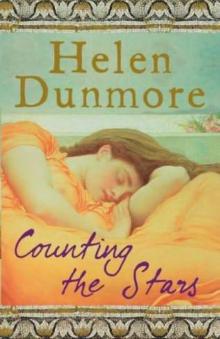 Counting the Stars
Counting the Stars With Your Crooked Heart
With Your Crooked Heart Burning Bright
Burning Bright House of Orphans
House of Orphans Mourning Ruby
Mourning Ruby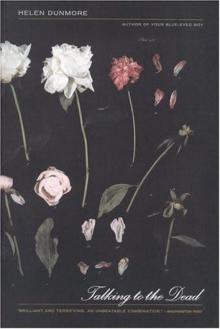 Talking to the Dead
Talking to the Dead Exposure
Exposure Ingo
Ingo The Malarkey
The Malarkey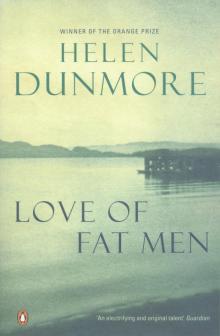 Love of Fat Men
Love of Fat Men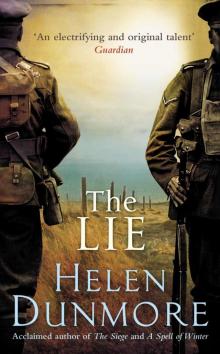 The Lie
The Lie The Siege
The Siege Inside the Wave
Inside the Wave Counting Backwards
Counting Backwards The Land Lubbers Lying Down Below (Penguin Specials)
The Land Lubbers Lying Down Below (Penguin Specials) The Greatcoat
The Greatcoat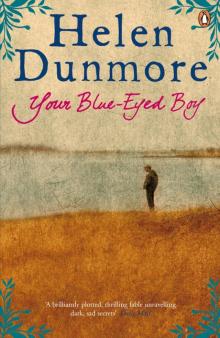 Your Blue Eyed Boy
Your Blue Eyed Boy Zennor in Darkness
Zennor in Darkness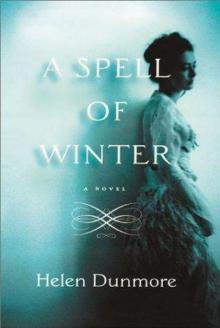 Spell of Winter
Spell of Winter Out of the Blue: Poems 1975-2001
Out of the Blue: Poems 1975-2001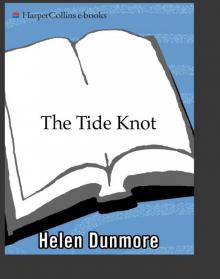 Tide Knot
Tide Knot The Betrayal
The Betrayal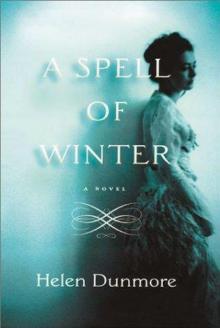 A Spell of Winter
A Spell of Winter Out of the Blue
Out of the Blue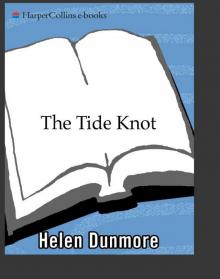 The Tide Knot
The Tide Knot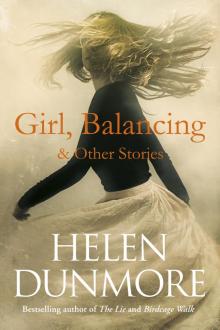 Girl, Balancing & Other Stories
Girl, Balancing & Other Stories Betrayal
Betrayal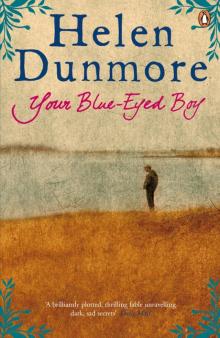 Your Blue-Eyed Boy
Your Blue-Eyed Boy